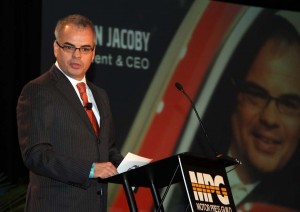China will play a key role in the planned doubling of global sales for Volvo Cars, the maker’s top executives revealed, as they outlined an ambitious plan to invest at least $10 billion in the company’s future.
That strategy will require a hefty investment by its new parent, China’s Geely Holding Group, said Geely CEO Li Shufu, though he stressed the two firms will continue to operate as “completely independent automaker(s).”
But increasingly, industry observers stress, the future of Volvo and Geely will become inextricably linked.
“We plan to invest $10 to $11 billion over the next five years globally,” Volvo CEO Stefan Jacoby told the Associated Press. That money will go towards not only a new assembly plant in China, but also help the maker develop a critical new platform and a new line of powertrains – both of which would be shared among a variety of future Volvo products.
The hefty investment plan follows Geely’s acquisition of Volvo, last August, from former parent Ford Motor Co. The U.S. maker let Volvo go for $1.5 billion, about a quarter of what it originally spent for the brand, but it nonetheless marked the biggest foreign acquisition made by a Chinese company yet.
Volvo struggled during its final years under Ford, in part because it found it difficult to command the hefty price premium of European rivals like Mercedes-Benz, Audi or BMW. But Jacoby is betting that Chinese motorists have a different perception of the Swedish brand and will be willing to pay more for its products.
Making a serious dent in what has become the world’s largest national car market will play “a significant role in this growth plan,” Jacoby noted, though he said he sees opportunities to build momentum in more established markets, including the U.S., which was traditionally the largest single outlet for Volvo products.
Volvo plans to establish its first Chinese manufacturing base in the southwest province of Chegdu, which not so coincidentally is right next to Geely’s own car plant. “That allows us to have (it) setup in a very quick time,” explained Jacoby, noting that his company is also looking at a second facility in Daqing.
While there are no plans to adds products specifically for China, Volvo is expected to tweak some of its designs to appeal to Chinese tastes – which would notably mean more room and luxury options in the back seats of Volvo products.
“By manufacturing here we have the opportunity to adapt our cars and tailor-make our cars for the needs of the Chinese customers,” Jacoby told the AP.
The executive joined Volvo last year after unexpectedly resigning from his post as CEO of Volkswagen’s U.S. sales subsidiary.
By 2020, Jacoby and Li hope to boost Volvo’s global sales to 800,000 annually.

